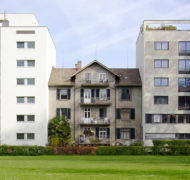Gentrification, Redemption, and the Kingdom of God
Blog / Produced by The High Calling
The idea of gentrification isn’t new. Cities like New Orleans, Detroit, and New York have been having conversations about the shifts in their communities’ economies, social structures, and housing opportunities for quite some time.
From an investment perspective, gentrification makes sense. Purchase property at a low price. Next, renovate or build something brand new. Then, move in or “flip” it. The final step? Repeat. More and more people join in. Everyone renovates properties, opens new businesses, and moves into the neighborhood, bringing their children and their tax dollars.
It sounds like a win-win for everyone. The community receives an injection of capital, crime rates decrease, and a new coffee shop opens its doors just steps from your front porch. The street lights stay on all night, and the city is reborn, redeemed, renewed.
Gentrification has its benefits. “There is strong evidence,” writes Patrick Sharkey, “that when neighborhood disadvantage declines, the economic fortunes of black youth improve, and improve rather substantially.”
Sometimes, however, established members of the community feel displaced by gentrification.
“my friends … aren’t buying $4.00 chocolate chip cookies at the swanky new bakery”
Increased property values drive up property taxes, utilities, and rent—often out of reach of the people who were there first, and whose jobs and station in life have not changed. Those whose roots run deep in one particular place sometimes feel as if the neighborhood shift places them in the uncomfortable role of “outsider” within their own hometowns. As Lisha Epperson writes:
“I don’t argue some of the benefits of gentrification. It started back in the day with a Body Shop on 125th St. Now there’s. M.A.C. and Duane Reade and Starbucks. It’s nice to have the convenience of major chains like this. But … my friends on the Madison Avenue bus aren’t buying $4.00 chocolate chip cookies at the swanky new bakery just off 116th St. They can’t afford it, and its presence keeps them at arm’s length from enjoying the benefits touted by this particular brand of community revival.”
As people of faith, we must make sure the good we’re doing is good for everyone. Cautioned by Jesus to pay attention to and care for the overlooked and ignored (Matt. 25:40, MSG), it makes sense to remember that our good work begins by considering the impact of our choices. Even when the effects of gentrification bring about positive change in a community, change is change. And change is difficult. We can keep this in mind, as we go. We can be sensitive to the losses—whether real or perceived—of those whose lives are impacted by our efforts to do good.
Daillo Smith is an entrepreneur who moved to Detroit from Houston. In a conversation with Christianity Today, Smith says this: "We Christians need to be at the forefront of being imaginative, creative, and innovative in bringing economic viability for cities that are hurting." And the article goes on to say, “The key for Christians, though, will be doing so in a way that rightly remembers their city's history—and their neighbors.”
Make sure the good we’re doing is good for everyone.
We are agents of redemption and partners with God in the work of restoration—not just for houses and properties and cities, but for people who live within the cities we seek to help thrive. This is the work of the Kingdom: bringing light and hope where there is darkness, fear, and hopelessness.
Jesus moved into the neighborhood and, when he did, he moved in to serve rather than to be served. When we “move into” a community—whether it be a church, a neighborhood, a workplace, a service organization, or as part of a short- or long-term missions trip—we, like Jesus, move in to be servants. We live to serve the good of the city and the people who live there, and not just ourselves.





